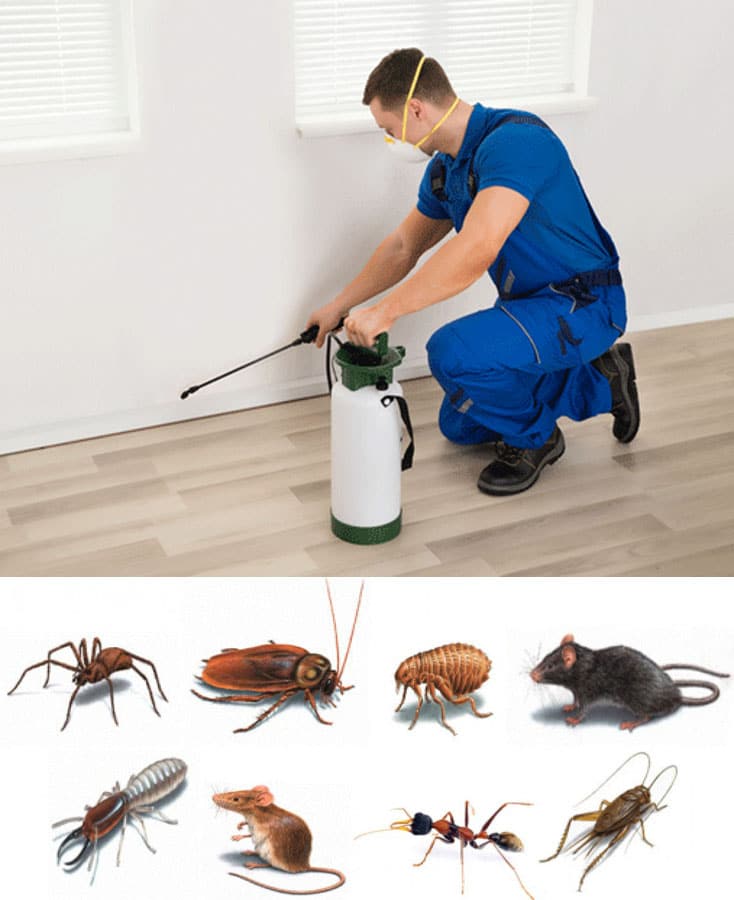Safe and Reputable Insect Control for Lasting Protection
Efficient insect administration needs a complex approach that stabilizes eco-friendly integrity with the need for reliable pest reductions. The subtleties of these techniques may not be immediately clear, triggering a closer evaluation of the methods that can lead to sustainable pest control end results.
Comprehending Parasite Control Approaches
Bug control encompasses a variety of methods targeted at managing and getting rid of undesirable insects and rats that can endanger both health and building. Comprehending these methods is critical for effective insect management.
The main categories of parasite control methods consist of mechanical, biological, and chemical approaches. Mechanical methods entail physical barriers and traps to avoid insect entry and capture unwanted varieties. For instance, making use of displays on home windows or employing sticky catches can substantially lower insect populations without introducing unsafe substances.

Chemical parasite control is typically the most acknowledged approach, utilizing chemicals to get rid of parasites. These chemicals can be efficient yet need to be utilized with care to prevent damaging results on non-target types and the environment.
Advantages of Eco-Friendly Solutions
How can green options change parasite control practices? The adoption of environmentally friendly bug control techniques uses countless advantages, substantially boosting the performance and security of pest management.

Another advantage is the positive effect on local biodiversity. Environmentally friendly solutions are made to target details bugs while preserving useful pests and wild animals, advertising a well balanced community. This approach aligns with the expanding customer need for sustainable practices, enhancing the track record of pest control companies.
Integrated Insect Monitoring Strategies
The implementation of environment-friendly remedies naturally brings about the adoption of Integrated Insect Administration (IPM) methods, which even more boost insect control efficacy. IPM is an alternative technique that integrates numerous strategies to handle bug populations while reducing environmental effect. This strategy stresses making use of biological, social, mechanical, and chemical controls, making certain a balanced and sustainable technique of insect administration.
One essential aspect of IPM is the complete assessment of bug activity and ecological conditions. By keeping track of pest populaces and identifying their life process, practitioners can carry out targeted treatments that disrupt the parasite's habitat or lifecycle, reducing dependence on chemical pesticides. In addition, cultural methods such as plant rotation and habitat manipulation can substantially diminish insect facility and recreation.
An additional critical element is making use of organic control representatives, such as valuable insects or microbes, which can naturally reduce insect populations. When chemical applications are needed, IPM prioritizes making use of low-risk chemicals and uses them uniquely, decreasing direct exposure to non-target microorganisms and humans.
Including IPM methods not only improves parasite control efficiency yet likewise advertises a safer environment, lining up with the expanding demand for lasting methods in insect monitoring.
Safe Practices for Home Owners
Understanding the value of safe techniques in bug control can pest control los angeles encourage property owners to successfully handle parasite problems while protecting their health and wellness and the setting. Applying non-toxic methods and precautionary actions is crucial in decreasing exposure to unsafe chemicals.
Home owners should first evaluate their setting for problems that attract pests, such as standing water, food, and clutter waste. Consistently cleaning and sealing entrance factors can discourage parasites from attacking the home. Making use of natural deterrents, such as necessary oils or diatomaceous planet, can give reliable choices to chemical pesticides.
When chemical therapies are required, house owners should select items that are specifically labeled as risk-free for domestic usage. It is vital to adhere to application standards carefully to prevent too much exposure. Moreover, making use of targeted treatments in areas where parasites are recognized, rather than blanket spraying, can significantly decrease chemical usage.
Finally, maintaining open communication with bug control experts is important. Property owners need to ask about the safety and security of items made use of and demand eco-friendly choices whenever possible. By taking on these secure techniques, house owners can produce a healthier living setting while properly taking care of insect issues.

Tips for Long-Term Protection
Developing a bug monitoring approach that stresses long-lasting protection can considerably boost the effectiveness of the risk-free practices previously gone over. To achieve this, property owners should implement normal evaluations of their property, concentrating on concealed areas such as attics, cellars, and crawl spaces. Early discovery of bug activity is vital in avoiding problems from holding.
These practices lower attractants that draw pests into the home. Sealing entry points, such as splits around home windows and doors, can effectively block potential pest gain access to.
Landscaping must also be taken into consideration; keeping plants cut and preserving a range between plant life and the home minimizes concealing areas for bugs. Utilizing natural deterrents, such as important oils or diatomaceous planet, can further dissuade invasions without considering extreme chemicals.
Last but not least, working together with a professional bug control service for regular analyses can give an extra layer of description safety. These specialists can offer tailored recommendations and advanced therapies, making certain that your home remains protected versus pests in the long term.
Final Thought
Finally, trusted and safe parasite control calls for a diverse technique that stresses green methods and incorporated parasite management. By applying all-natural deterrents, carrying out normal assessments, and preserving proper sanitation, residential or commercial property owners can dramatically reduce insect go to my blog populations while securing helpful insects and the environment. Collaboration with expert parasite control solutions enhances the effectiveness of these approaches, making certain customized remedies that provide lasting defense and satisfaction versus future invasions.
Efficient bug management requires a diverse approach that balances ecological stability with the need for effective parasite reductions. The adoption of environment-friendly parasite control methods provides many benefits, considerably boosting the performance and security of pest management.The execution of eco-friendly services normally leads to the adoption of Integrated Pest Management (IPM) strategies, which better boost bug control efficacy. exterminator coquitlam. By monitoring bug populations and identifying their life cycles, specialists can execute targeted treatments that disrupt the parasite's environment or lifecycle, minimizing reliance on chemical pesticides.In final thought, trustworthy and safe bug control needs a diverse technique that highlights environment-friendly methods and incorporated insect administration